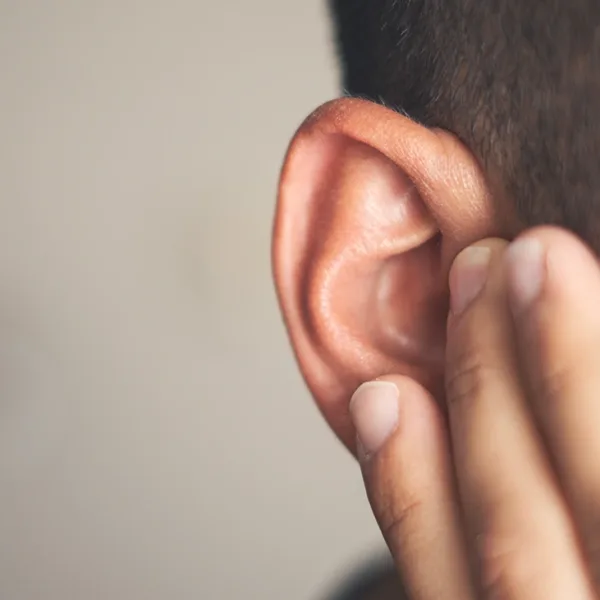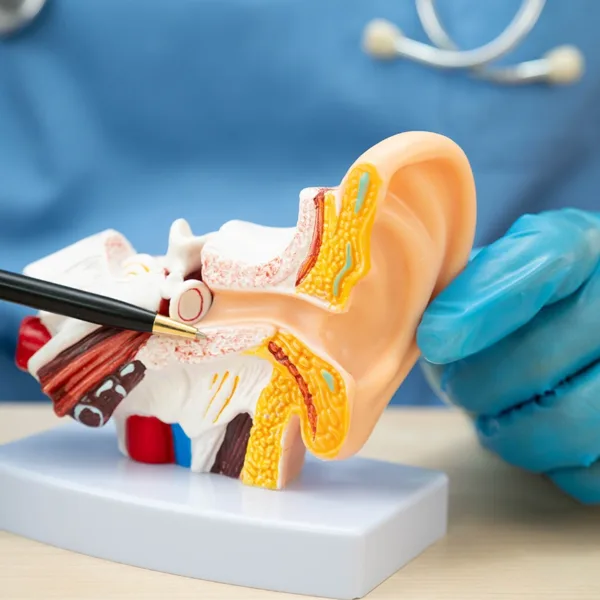
According to the CDC, smoking cigarettes is the leading cause of preventable disease in the United States.1 When people think about the risks of smoking, hearing damage isn’t always the first thing to come to mind. However, research suggests there is a significant link between cigarettes and hearing loss.2
In this article, we explore the damaging effects smoking cigarettes and secondhand smoke can have on auditory health.
Smoking Cigarettes and Hearing Loss
Research shows that cigarette smokers are 70% more likely to develop hearing loss, even when other health factors are taken into account.3 Hearing loss typically develops gradually over time, often going unnoticed until symptoms become severe. This has been observed across all age groups, making it a concern regardless of how long a person has smoked.
Research has also found that the risk of developing hearing loss can extend to those exposed to secondhand cigarette smoke, even if they don’t smoke directly.
Secondhand Smoke and Hearing Loss
Even if you don’t smoke yourself, regular exposure to secondhand smoke can still harm your hearing. In fact, regular exposure to secondhand smoke can raise the risk of hearing loss by 40%.4
But how exactly do cigarettes contribute to hearing damage? We break it down below.
How Cigarettes Contribute to Hearing Loss
The type of hearing loss most commonly linked to cigarette smoking is Sensorineural Hearing Loss (SNHL). This form of hearing loss occurs when there is damage to the inner ear (cochlea) or to the fragile hair cells that carry sound from the inner ear to the brain. Since these hair cells do not regenerate, any damage to them results in permanent hearing loss.
The CDC reports that over 7,000 chemicals and heavy metals can be found in a cigarette, many of which are known to have toxic effects on the body.2 Many of these substances can have a lasting impact on your hearing health, and this risk only increases with every cigarette smoked.5
Below are just a few of the ways that nicotine and cigarette smoke can contribute to hearing loss.
Reduced Blood Flow to the Inner Ear
Cigarettes contain chemicals like nicotine and carbon monoxide, which can cause blood vessels to constrict (tighten). This makes it harder for blood to circulate properly and deliver vital oxygen and nutrients throughout the body.
The inner ear relies on a steady, oxygen-rich blood supply to keep the auditory system healthy. Over time, this reduced blood flow can damage the delicate hair cells responsible for detecting sound, resulting in permanent hearing loss.
Increased Risk of Noise Damage
Noise-induced hearing loss (NIHL) is a type of sensorineural hearing loss caused by repeated or intense exposure to loud sounds. Research shows that smoking cigarettes can amplify the harmful effects of noise on the inner ear, significantly increasing the risk of NIHL.6
Reduced blood flow to the inner ear makes it harder for the auditory system to recover from noise-related stress. As a result, sounds that might not cause permanent damage on their own can become much more harmful when combined with the effects of smoking.
Damage to the Auditory Nerve
Our brains rely on chemicals called neurotransmitters to communicate with the rest of the body. In the auditory system, a neurotransmitter called glutamate acts as a messenger between the inner ear and the brain.
Nicotine—the main addictive chemical in cigarettes—can cause the body to release more glutamate than it needs. When there’s too much glutamate in the body, it can overstimulate and damage the auditory nerve.
This is known as excitotoxicity, and over time, it can lead to permanent hearing loss.7
Increased Risk of Ear Infections
Research shows that smoking can suppress the immune system, making it harder for your body to fight off infections, including ear infections.8 A weakened immune response means that smokers may develop ear infections more frequently, and those infections may take longer to heal.
Over time, recurring or prolonged ear infections can lead to lasting damage in the middle and inner ear, increasing the risk of hearing loss.
Chronic Inflammation
Smoking cigarettes can lead to chronic inflammation in the body. When the chemicals in cigarettes enter the bloodstream, it can trigger the immune system to respond as if there’s a constant threat. This causes ongoing inflammation throughout the body.
Chronic inflammation can damage the tiny hair cells in the inner ear that are responsible for detecting sound, as well as the blood vessels and nerves that support hearing. Since these hair cells and nerve pathways do not regenerate, prolonged inflammation caused by smoking can result in permanent hearing loss.
Increased Free Radicals in the Body
Smoking cigarettes introduces a high level of harmful free radicals into the body. Free radicals are unstable molecules that damage healthy cells and contribute to a wide range of health problems, including hearing loss. Just one puff of cigarette smoke contains trillions of these damaging molecules.9
Free radicals can damage the delicate structures in the inner ear that are essential for hearing. Because these structures do not regenerate, ongoing exposure to free radicals from smoking can lead to permanent hearing loss.
Schedule a Hearing Check-Up at an Audibel Clinic Near You
Getting regular hearing tests is an important part of maintaining your overall health, especially if you smoke or are frequently exposed to secondhand smoke. The research is clear: smokers and those around them face a higher risk of developing hearing loss.2 Routine hearing exams are essential for detecting any changes in your hearing as early as possible.
Don’t wait—take control of your health by scheduling a hearing exam at an Audibel clinic near you.
References
- About secondhand smoke. (2024, May 15). Smoking and Tobacco Use. https://www.cdc.gov/tobacco/secondhand-smoke/
- Kumar, A., Gulati, R., Singhal, S., Hasan, A., & Khan, A. (2013). The effect of smoking on the hearing status –A hospital based study. JOURNAL OF CLINICAL AND DIAGNOSTIC RESEARCH. https://doi.org/10.7860/jcdr/2013/4968.2730
- Hu, H., Sasaki, N., Ogasawara, T., Nagahama, S., Akter, S., Kuwahara, K., Kochi, T., Eguchi, M., Kashino, I., Murakami, T., Shimizu, M., Uehara, A., Yamamoto, M., Nakagawa, T., Honda, T., Yamamoto, S., Hori, A., Nishiura, C., Okazaki, H., . . . Dohi, S. (2018). Smoking, smoking cessation, and the risk of hearing loss: Japan Epidemiology Collaboration on Occupational Health study. Nicotine & Tobacco Research, 21(4), 481–488. https://doi.org/10.1093/ntr/nty026
- Dawes, P., Cruickshanks, K. J., Moore, D. R., Edmondson-Jones, M., McCormack, A., Fortnum, H., & Munro, K. J. (2014). Cigarette smoking, passive smoking, alcohol consumption, and hearing loss. Journal of the Association for Research in Otolaryngology, 15(4), 663–674. https://doi.org/10.1007/s10162-014-0461-0
- Lin, B. M., Wang, M., Stankovic, K. M., Eavey, R., McKenna, M. J., Curhan, G. C., & Curhan, S. G. (2020). Cigarette smoking, smoking cessation, and risk of hearing loss in women. The American Journal of Medicine, 133(10), 1180–1186. https://doi.org/10.1016/j.amjmed.2020.03.049
- Mostaghaci, M., Mehrparvar, A., Mollasadeghi, A., Hashemi, S., Sakhvidi, M. Z., & Davari, M. (2015). Simultaneous effects of noise exposure and smoking on OAEs. Noise and Health, 17(77), 233. https://doi.org/10.4103/1463-1741.160716
- Mao-Li, D. (n.d.). Glutamate receptor antagonist and neurotrophin can protect inner ear against damage. Journal of Otology, 4(1), 26–33. https://doi.org/10.1016/s1672-2930(09)50005-0
- Mahmoudzadeh, L., Froushani, S. M. A., Ajami, M., & Mahmoudzadeh, M. (2022). Effect of nicotine on immune system function. Advanced Pharmaceutical Bulletin. https://doi.org/10.34172/apb.2023.008
- Church, D. F., & Pryor, W. A. (1985). Free-radical chemistry of cigarette smoke and its toxicological implications. Environmental Health Perspectives, 64, 111–126. https://doi.org/10.1289/ehp.8564111







Have a question or Comment?